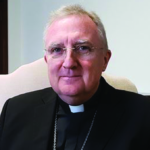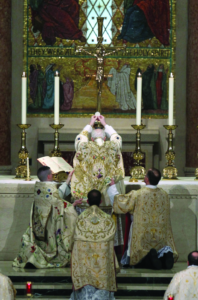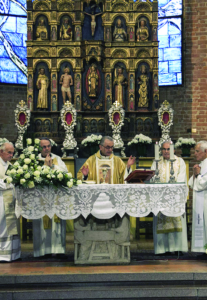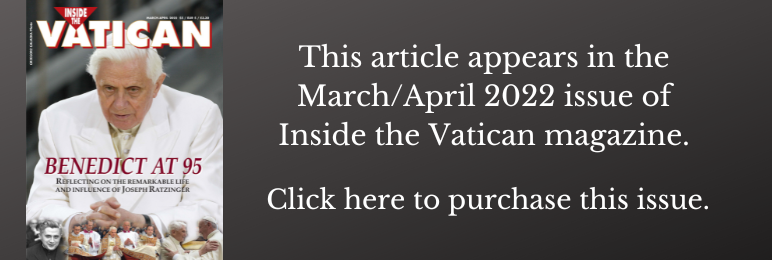But are his reasons theologically sound?

Archbishop Arthur Roche, Prefect of the Congregation for Divine Worship in Rome
By James Baresel

Mass in the old rite
 Those who read the recent public statements made by Archbishop Arthur Roche, Prefect of the Congregation for Divine Worship, in his attempt to justify the changed regulations for use of the Traditional Latin Mass, cannot fail to be struck by one fact: Even if his arguments are perfectly sound as reasons for the Missal of Paul VI to hold the “ordinary” status they did under Benedict XVI — with the Traditional Latin Mass as an “extraordinary” but permanent liturgical form of the Roman Church — they are nevertheless feeble and unconvincing as reasons for his professed goal of eventually eliminating the Traditional Latin Mass from the life of the Church.
Those who read the recent public statements made by Archbishop Arthur Roche, Prefect of the Congregation for Divine Worship, in his attempt to justify the changed regulations for use of the Traditional Latin Mass, cannot fail to be struck by one fact: Even if his arguments are perfectly sound as reasons for the Missal of Paul VI to hold the “ordinary” status they did under Benedict XVI — with the Traditional Latin Mass as an “extraordinary” but permanent liturgical form of the Roman Church — they are nevertheless feeble and unconvincing as reasons for his professed goal of eventually eliminating the Traditional Latin Mass from the life of the Church.
Three Demonstrative Examples:
1) Speaking to a Swiss television station, the archbishop expressed the opinion that “What was produced in 1570 was entirely appropriate for the time. What is produced in this age is also entirely appropriate for the time.” That might sound plausible if it was merely saying that most people of this age will pray better using the Missal of Paul VI and that therefore it is appropriate for this to be the “ordinary” liturgical form of the Roman Church. But it has no logical bearing on whether it is reasonable or appropriate to allow another liturgy (from a previous age) to remain as a permanent (if exceptional) option for those who pray better using it.
2) In an interview given to Rome journalist Edward Pentin, Roche said that “the liturgy is never simply a matter of personal tastes or preferences.” How does this reconcile with the fact that Catholics are free to choose between attending the Roman, Byzantine, Maronite and other rites on the basis of their personal tastes and preferences? Conformity with certain essential Catholic principles takes precedence over personal tastes and preferences. But since the Traditional Latin Mass and the Mass of Paul VI are both in conformity with those essential Catholic principles, personal tastes and preferences are a legitimate consideration.
3) In the same interview, the archbishop stated that the “Ambrosian, Gallican, Dominican or the Anglican (Ordinariate)” liturgies are approved “for specific reasons.” No reason is given for why the Traditional Latin Mass cannot remain in permanent (if exceptional) use for other specific reasons.
The explanation for such feeble and unconvincing arguments is simple. If the Traditional Latin Mass is theologically legitimate, then it is sensible to allow its continued use (on a permanent basis) by faithful Catholics who prefer it. With rare exceptions, there have only been three situations in which Church authorities have attempted to suppress specific liturgical forms: first, if those affected by the change were content to go along with the change; second, if there was some concern about the orthodoxy of the forms being suppressed; and third, if the suppressed forms had been introduced as novelties.
Because of the foregoing, Archbishop Roche has two choices. Either he can use feeble and unconvincing arguments to justify his goal of eliminating the Traditional Latin Mass; or, he can use a claim which would, if true, justify eliminating the Traditional Latin Mass but which suffers from the problem of being heretical—the claim that the Traditional Latin Mass is at odds with Catholic theology. But for Roche to use the latter, patently indefensible claim would constitute admission that his project is grounded in illegitimate motives and aimed at illegitimate ends. Hence his prominent public statements are limited to the feeble and unconvincing.
But a little known quasi-public lecture that Roche presented at the Pontifical University of the Holy Cross in February of 2020 reveals that his prominent use of feeble and unconvincing arguments is duplicitous at best, and mendacious at worst. That lecture was ironically and disingenuously titled “The Roman Missal of Saint Paul VI: A Witness to Unchanging Faith and Uninterrupted Tradition.” In reality, it argued that both the Missal of Paul VI and the Second Vatican Council changed the theology of the Mass and of the Church, thus interrupting Tradition.
According to the archbishop: “The Tridentine Missal considered the priest alone as celebrant” and was based on “a solely clerical vision of the liturgy, in which the clergy alone are active and the faithful passive.” He claims that the Missal of Paul VI is based on a supposedly contradictory belief that the Mass is “the action of the Christus totus [the Church].” And he claims that because of this, the laity should participate externally — by making the responses, etc.
In reality, there was only a change of emphasis. Catholic dogma is quite clear that a priest alone can celebrate a valid Mass without any other member of the Church present—and the Missal of Paul VI explicitly allows for this. At the same time, the prayers of the Tridentine Missal and the traditional understanding of that Mass make clear that those attending it are “active” in that liturgical action as part of “the whole Christ.” Many of the Tridentine texts use the first person plural in addressing the Lord. For example, “Offerimus tibi Domine calicem salutaris”—“We offer you, Lord, the chalice of salvation.” In the Missal of Paul VI, the priest often uses the plural in the same way, speaking alone but on behalf of “the whole Christ.”
The question of whether the congregation makes the responses to these priestly prayers does not change the theological reality of what is happening. In the Tridentine Mass, it was always understood that the acolytes made the responses on behalf of the congregation. The difference between the two missals is simply this: the Tridentine can be compared to a system of judicial procedure in which a jury foreman announces the verdict on behalf of the entire jury; that of Paul VI can be compared to a system of judicial procedure in which each jury member individually affirms the verdict. Archbishop Roche seems to make the common mistake of equating the type of “lack of external activity” proper to jury members (who participate in a trial) with the type of “lack of external activity” proper to people watching a trial (who are non-participant spectators).
Magisterial theology, however, recognizes this distinction. Both Pope Pius XII’s encyclical Mediator Dei and the Sacred Congregation of Rites’s 1958 instruction De Musica Sacra et Sacra Liturgia state that “external” participation by members of the congregation (making the responses, etc.) is better and to be encouraged, but that “non-external” participation (silently reading the prayers in a missal, meditations and mental prayer, saying the rosary, etc.) are also legitimate and constitute true “participation.”
Archbishop Roche further argued that the alleged change in the theology of the Mass was itself influenced by an alleged “replacement” of “the previous notion of the Church as a perfect society…with that of the Church as sacrament and the biblical concept of the People of God..constantly open to reform and conversion.”
There are two senses in which Catholic theology did and still does consider the Church a “perfect society.” First, there is the Aristotelian concept of a “perfect society” as one that has everything it strictly needs for its purpose within itself. Second, there is the sense of the infallibility and indefectibility of the Church making it a “perfect society.” Neither is incompatible with the Church as the people of God or with openness to reform and conversion. But such reform and conversion cannot include “replacement” of previously established principles of theology—such as the doctrine of the Church as a perfect society or the belief that the congregation’s “external” participation at Mass is non-essential.
In his assertion that the Missal of Paul VI and the Second Vatican Council broke with previous theology, Arthur Roche is actually in agreement with Marcel Lefebvre. The position of both archbishops is that a rupture took place.
Their disagreement concerns only whether that rupture was good or bad. Roche does not seem to realize that the legitimacy, integrity and credibility of Vatican II and the Missal of Paul (legitimacy, integrity and credibility which I do not doubt) depend on the fact that they did not “replace” earlier theologies of the Church or of the liturgy—or, more correctly, depend on that fact that it is theologically impossible for a General Council and a papal liturgical reform to “replace” those earlier theologies.






Facebook Comments